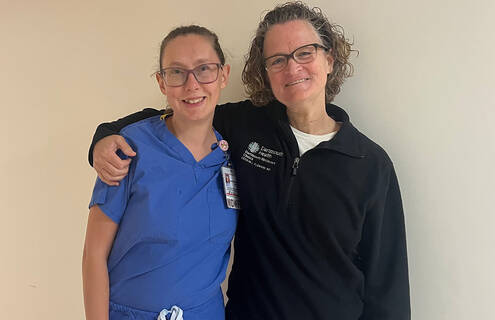
Using an obstetrician was not a part of the birthing plan for the wife of Certified Nurse Midwife, Elizabeth D. Krainchich, MN, APRN, CNM.
But when her wife had labor complications and needed a Cesarean Section (C-Section), Krainchich was relieved that their birthing team included an obstetrician.
“Everything was mostly normal for her. But she had a really long labor and finally got to pushing and our daughter just would not come further down. And then the doctor came and did the C-Section with our midwife, so we got the best of both worlds,” she says.
Midwives and obstetricians are trained in different approaches to care
Krainchich delivers babies at Elliot Hospital as part of a team of certified nurse midwives (CNMs) and obstetricians from Dartmouth Hitchcock Clinics Manchester/Bedford that provides maternal care, delivery, and inpatient reproductive services at the clinic and hospital.
On her team, obstetricians and CNMs support each other.
“We have a collaborative model,” says her colleague and Obstetrics Gynecology Department Chair, Cecilia L. Clemans, MD, FACOG.
That’s because while both CNMs and obstetricians are trained and equipped to provide care during pregnancy and labor, there are differences in their education, qualifications, and focus, say Krainchich and Clemans.
What a certified nurse midwife does
CNMs like Krainchich are registered nurses with advanced degrees, master's level or higher, who specialize in the healthcare of pregnant individuals and those seeking gynecologic care. They are also certified midwives by the American Midwifery Certification Board (AMCB), with a broad scope and qualifications of practice that distinguish them from other midwives.
CNMs offer:
- a full range of care during pregnancy, labor and delivery, and postpartum, including for the newborn
- pregnancy check-ups, screenings, exams, and other types of monitoring of your health and that of your developing fetus or baby
- general gynecological care, including well-woman exams, family planning, contraceptive counseling, and medical prescriptions.
Krainchich and Clemans say that if you or your baby is at low risk of developing complications, CNMs are usually equipped to be your lead healthcare provider. Clemans also points out that their team’s CNMs have more time to spend with you at appointments, discuss concerns, educate, and develop individualized birthing plans.
Studies also show that when a certified midwife is involved in caring for the patient, pregnancies have lower rates of C-Sections and epidurals. That’s in part because their focus is on supporting and providing care for what Krainchich calls a pregnancy that is "normal". Krainchich prefers not to use the term "natural," which she believes can do you a disservice if you end up needing medical support that falls outside your definition of what "natural" means.
“I think sometimes 'natural' in people's minds means it all needs to go one particular way. But some of the worst postpartum depression I have seen has been with people who had very, very strict birth plans and came in saying I only want natural, I only want natural, and nothing ever goes as planned in birth. It is the most unpredictable process you could have,” she explains.
That unpredictability is part of the reason why you might need an obstetrician.
What an obstetrician does
Obstetricians follow what is called a medical model of care, meaning their education, training, and experience especially equip them to deal with:
- medical conditions
- complex pregnancies (such as twins or multiples)
- situations that require surgery and other medical interventions.
They are generally better suited than CNMs to address pregnancy and labor concerns that fall outside of the range of "normal" and to be the lead provider for high-risk pregnancies, some of which can be the result of pre-existing conditions. For example, pre-existing diabetes can lead to higher blood pressure, kidney disease, or a greater risk of babies developing birth defects.
Because obstetricians are medical doctors, they have the knowledge and training to handle these and other complications, treating and monitoring your health and your developing fetus or baby.
When you might benefit from both
“In pregnancy and childbirth, there's always an element of the unknown,” says Krainchich.
“Somebody who is completely uncomplicated and has had no issues can very suddenly find themselves in a high-risk situation,” adds Clemans.
These changing needs are why it can be necessary to have both an obstetrician and a certified midwife or CNM.
“When I'm working with our midwives, I know everything that's happening with all of her patients, and similarly, she knows everything that's happening with all of my patients,” says Clemans. “Because I have a very close working relationship with each of them and have been updated along the way, I can immediately step in.”
The reverse also holds true. Krainchich shares an example of a high-risk labor situation where the obstetrician asked her to help reposition a baby because her training and experience meant she was more skilled in that procedure and could help.
Why Clemans and Krainchich like the combined team approach
“The team at Dartmouth Hitchcock Clinics Manchester/Bedford offers robust, dynamic care because we all come at things a little bit differently. It's like going from two-dimensional to three-dimensional care. Patients feel like they have every available option. No matter what happens in their pregnancy, they're going to have all the right people taking care of them,” says Krainchich.
In fact, when it comes to providing pregnancy care and childbirth services, neither she nor Clemans would have it any other way.
“We complement one another,” says Clemans.